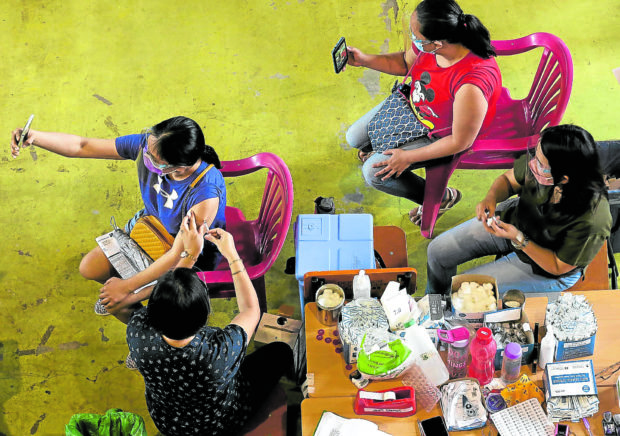
PROOF OF VACCINATION: Two women take selfies as they get their inoculation at a Taguig City school on Sept. 10. (RICHARD A. REYES / Philippine Daily Inquirer)
MANILA, Philippines — While the Department of Health (DOH) acknowledged the country’s dead-last placement in Bloomberg’s latest COVID-19 Resilience Ranking of 53 major economies, it stressed that there had been improvements in its pandemic response.
In an online briefing on Wednesday, Health Undersecretary Maria Rosario Vergeire said the DOH was “open” to surveys and analyses like the one conducted by Bloomberg, saying it “gives us more direction.”
However, she pointed out that based on the study’s own metrics of measuring resilience through the three major areas of virus containment, economy, and opening up restrictions, the Philippines has “tremendously improved,” particularly in vaccine coverage.
“When you look at our response, we have already improved. We can see that our vaccination coverage has tremendously improved from the time we started,” Vergeire said.
Out of 53 countries
Of 53 countries, the Philippines ranked last in Bloomberg’s COVID-19 Resilience Ranking of the best and worst places to be amid the pandemic.
The study measured COVID-19 resilience based on specific indicators, including vaccination coverage; severity of lockdowns and restrictions; progress on restarting travel, particularly air travel; easing border curbs; case fatality rate; and overall mortality during the pandemic.
Addressing the issue of virus containment, Vergeire said the country’s situation of experiencing highs and lows in new daily cases was not unique.
“All countries in the world are experiencing this cycle when cases go up and then go down. These are all being experienced [by other countries] and we are trying to learn day by day because the situation is really evolving,” she said.
She cited the government’s revised quarantine strategy of moving from widescale community quarantine classifications to the pilot alert level system as proof that the government was doing more to address the reopening of the economy and easing restrictions.
Strategy shift
“When it comes to the safe reopening of the economy, this is why we had a shift in strategy. We saw that community quarantines were no longer effective, hence we shifted to alert levels which will benefit both health and the economy, so we can safely reopen,” Vergeire said.
Presidential spokesperson Harry Roque downplayed the report on Wednesday, saying the results were not surprising since rich countries had more vaccines available for their citizens, making their economic recovery from the pandemic much faster.
“Vaccines are key toward defeating COVID-19. Unfortunately, as President Duterte articulated in the United Nations, ‘Rich countries hoard life-saving vaccines, while poor nations wait for trickles.’ The Philippines is a classic case in point where inoculation is highly dependent on the availability and stability of vaccine supplies,” Roque said in a statement.
SEA at the bottom
“The Philippines, [on] many numerous occasions, has advanced its position on the universal access to COVID-19 vaccines, for the plain fact that the pandemic will not end unless the coronavirus is defeated everywhere through vaccination,” he added.
The Philippines and its Southeast Asian (SEA) neighbors, namely Indonesia, Thailand, Malaysia and Vietnam, were at the bottom of the list while developed countries such as Ireland, Spain, the Netherlands, Finland and Denmark were on top.
Roque said the resilience ranking was also in line with the administration’s notion of total health, which he personally advocated, “where the reopening of more industries and businesses allowing more people to return to their livelihood must be balanced with improving the country’s healthcare system capacity.”